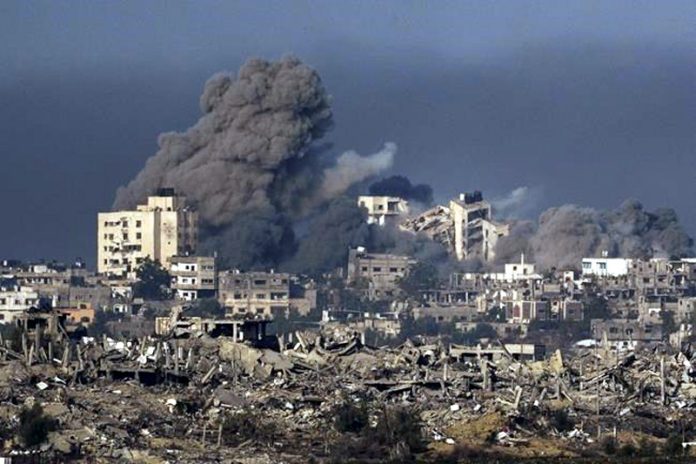DEIR-AL-BALAH (Gaza Strip), Nov 23 : A four-day cease-fire in Gaza between Israel and Hamas will began Friday morning, Qatar said, a day later than originally announced, as negotiators worked out final details of the deal, which is to lead to the release of dozens of hostages held by militants and Palestinians imprisoned by Israel.
The diplomatic breakthrough promised some relief for the 2.3 million Palestinians in Gaza who have endured weeks of Israeli bombardment, as well as families in Israel fearful for the fate of their loved ones taken captive during Hamas’ October 7 attack that triggered the war.
The deal appeared to hit a last-minute snag when Israel’s national security adviser, Tzachi Hanegbi, announced a one-day delay late Wednesday, without providing a reason. The cease-fire was originally set to begin Thursday morning.
On Thursday, Majed al-Ansari, a spokesman for the Foreign Ministry of Qatar, which played a key role in mediating with Hamas, announced the cease-fire will start at 7 a.M. Local time Friday (5 a.M. GMT.)
He said the two sides had exchanged lists of those to be released, and the first group of hostages held by Hamas — including 13 women and children — would be freed Friday afternoon. Increased aid for Palestinians will start to enter “as soon as possible,” al-Ansari said.
NETANYAHU SAYS TRUCE WON’T END WAR
The truce agreement had raised hopes of eventually winding down the war, which has levelled vast swaths of Gaza, fuelled a surge of violence in the occupied West Bank, and stirred fears of a wider conflagration across the Middle East.
Air raid sirens sounded across northern Israel on Thursday as Hezbollah said it fired 48 Katyusha rockets from southern Lebanon. The barrage came after an Israeli strike killed five Hezbollah fighters, including the son of the head of the group’s parliamentary bloc.
The Israeli military said it was striking the sources of the launches. Israel and Hezbollah, which fought a monthlong war in 2006, have repeatedly traded fire across the border since the war in Gaza broke out.
Prime Minister Benjamin Netanyahu vowed to continue the war after the truce expires, with the goal of destroying Hamas’ military capabilities, ending its 16-year rule in Gaza and returning all of the estimated 240 captives held in Gaza by Hamas and other groups.
“We will continue it until we achieve all our goals,” Netanyahu said, adding that he had delivered the same message in a phone call to US President Joe Biden. Washington has provided extensive military and diplomatic support to Israel since the start of the war.
HOSTAGES TO BE FREED IN STAGES
Under the truce deal, 50 hostages are supposed to be freed in stages, in exchange for the release of what Hamas said would be 150 Palestinian prisoners. Women and children would be released first, and Israel said the truce would be extended an extra day for every additional 10 hostages freed.
The return of hostages could lift spirits in Israel, where their plight has gripped the country. Families of the hostages have staged mass demonstrations to pressure the government to bring them home.
Qatar said the cease-fire would allow a “larger number of humanitarian convoys and relief aid” to enter Gaza, including fuel, but it gave no details on quantities.
Israel cut off all imports at the start of the war, except for a trickle of food, water and medical supplies allowed in from Egypt. The lack of fuel has caused a territory-wide blackout, leaving homes and hospitals reliant on generators, which have also steadily been forced to shut down.
Israel’s Justice Ministry published a list of 300 prisoners eligible to be released, mainly teenagers detained over the past year for rock-throwing and other minor offenses.
The war erupted when several thousand Hamas militants stormed into southern Israel, killing at least 1,200 people, mostly civilians, and taking scores of hostages, including babies, women and older adults, as well as soldiers, for whom Hamas is expected to demand a large number of high-profile prisoners.
More than 1.7 million people, three-fourths of Gaza’s population, have been displaced in the war. Many, if not most, will be unable to return home because of the vast damage and the presence of Israeli troops in the north.
Israel has barred imports to Gaza since the start of the war, except for a trickle of aid. Humanitarian aid groups operating in Gaza said the truce will prove too short and the Rafah crossing’s capacity insufficient to meet urgent needs. (AP)


